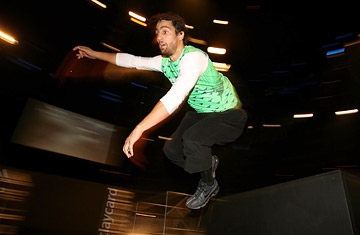
Athletes compete during the world Free Running championships in London on September 3, 2008.
Tim "Livewire" Shieff is a stocky young chap with forearms as thick as tree trunks and a neck to match. He stands on a railing at the edge of a platform some 20 feet (6-m) above a north London stage. Back-flipping to the ground, he scrambles atop a wall, and, after somersaulting off that, bounds onto a ledge before leaping to the ground again, landing in a perfect handstand. Over earsplitting cheers from the audience, the MC gives his verdict: "That," he said, "was ridiculous."
"Ridiculous" stunts were good and "sick" ones even better at the first ever free running world championships, held Sept. 3 inside a London performing arts center. Blending running, jumping and climbing with all manner of vaults, spins and flips, nearly two dozen competitors from 18 countries took on the specially created course, each with their own routine and soundtrack.
Those adept at free running — a variant of parkour, born in the Paris suburbs a decade or so ago — are usually more at home outdoors, scaling walls and leaping roof tops in cities around the world. But as the pastime has taken off — showcased in movies from Bond to The Bourne Ultimatum, free running practitioners now number 15,000 in the U.K. alone — it was time to move indoors to compete.
As world championships go, things could scarcely be more relaxed. Sporting sweat pants and T-shirts, athletes judged each other's 90-second routines for skill, difficulty and flow, whittling down the field through three rounds of competition. And forget squabbles come elimination time: as results were announced, competitors joined in group hugs and endless backslapping. Athletes on the stage in London talked of being part of one big family, and they weren't just talking: all of them stayed together in the same London hostel.
Not everyone was smiling, though. Seconds into the competition, after failing to find the wall 12-feet (4-m) below him, Mexican free runner Jorge Manuel Nava Romero broke his fall with his chin, losing teeth in the process. "Please don't copy this at home," cautioned the MC. (Romero, the announcer later added, was "all good" after his tumble.)
The event also brought some gripes that free running should not be holding a competition because it was based on something more, well, spiritual. Free runners' "movements would no longer be a reflection of them as much as it would be competing for the judges," wrote one chat room user on a free-running website recently. "Free and competition just seem to not go together well." And free running's flamboyance and flair don't impress everyone; hard-core parkour fans instead prize efficiency and speed in their movement.
To organizers, though, such events are crucial to free running's survival. There are plenty of brands — from Adidas to Hewlett-Packard — keen to feature free running in their advertising at the moment, but that interest is "going to die out at some point," reckons Paul Corkery, a 34-year-old Londoner in charge of Urban Freeflow, the team of free running teachers and performers behind the London event. Prolonging the sport's life requires taking the initiative.
Not to mention sponsor's cash. Billboards for Barclaycard and Sony Ericsson, just two of the event's sponsors, lined the London venue. Keen to tap the sport's broad audience — pinstripe suits and polka-dot dresses figured among the sweat pants and sneakers in the crowd — Dan Mathieson, head of sponsorship at Barclaycard, even claimed "the fluidity and freedom of movement associated with free running mirror the key needs of Barclaycard customers." To fans of the free-spirited sport, that's a tough sell: Mathieson's presence on the stage at the end of competition drew loud jeers from the crowd.
But that hasn't stopped others looking to cash in on the pursuit's rising profile. "This is where skateboarding was 30 years ago," says Laura Sanders, global sales director for U.S.-based climbing shoe maker Five Ten, who flew in from California to watch the event. Confident in the sport's potential, the firm has designed shoes for free runners, and is even looking into sponsoring top athletes. Free running "needs to be treated like a sport," agrees Gabriel "Jaywalker" Nunez, the 25-year-old from Los Angeles whose flips and twists eventually earned him the inaugural title of world champion, beating Britain's Shieff into second. "Everyone trains like athletes." Ridiculousness, after all, doesn't come easy.
